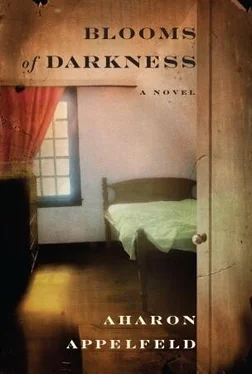“Do they want to catch me?” Hugo couldn’t keep from asking.
“Certainly. They’re going from house to house and looking for Jews. But you have nothing to fear. You’re mine. You look like me, right?”
Her words, meant to calm him down, sowed disquiet in him. He immediately saw many soldiers before his eyes, swarming over the houses and dragging out the people who were in hiding.
“Will they look here, too?” Hugo asked cautiously.
“They wouldn’t dare look in my room and in my closet.”
Mariana’s speech is simple and unadorned. But every word of hers quickly becomes a picture that stays with him for a whole day, sometimes for two days.
“It’s hard for me to understand why they’re persecuting the Jews,” she said once. “There are good people among them, not to mention your mother, Julia, who devoted her whole soul to humanity. Not a week passed that she didn’t bring me fruit and vegetables.”
When she said, “devoted her whole soul,” Hugo saw his mother as a long, thin bird gliding over the town’s streets, landing here and leaving a parcel of food, landing there and giving a bundle of clothes to a poor woman. His father used to say, “Language is a tool for thought. You have to express yourself clearly and precisely.” “Clarity” and “precision” were key words for him. Hugo’s mother wasn’t precise the way his father was. But every word that came from her mouth quickly became a picture. And that, amazingly, was what happened with Mariana. It’s strange, but a spare way of speaking can also be colorful. This thought flashed through his head.
But on the days when Mariana is despondent, a cloud covers her face, and she neither asks for nor promises anything. She hands Hugo a cup of milk and immediately throws herself down on the bed and sleeps for hours. Sometimes the sleep soothes her dejection. She gets up another woman, tells him about her dream, and hugs him against her body. Such an hour is an hour of grace, and Hugo knows how to appreciate it.
But sleep doesn’t usually free Mariana from the bonds of depression. What oppressed her before she went to sleep continues to oppress her. She stamps her feet and breaks bottles, announces that in the coming days she will run away from here. These desperate declarations always sow disquiet in Hugo’s soul, but one smile from her is enough to scatter the clouds of fear — he is immediately certain that Mariana won’t sell him or abandon him.
Thus the days pass. Sometimes he sees Otto and sometimes Anna. When they are revealed to him, he is so happy that he wants to kiss them hard, the way Mariana kisses him. Once both of them appeared, and Hugo called out in astonishment, “Darlings!” Hearing that strange appellation, they opened their eyes wide but didn’t say a thing.
Anna told Hugo about her village in the mountains, and Otto disclosed to him that he, too, had found shelter in a village. For a moment it seemed to Hugo that in a short time the war would be over, and everyone would return to where they had come from and to their ordinary lives. But in his heart Hugo knows that what had been would never be again. The time in the ghetto and in hiding is already embossed on his flesh, and the power of the words he would use has faded. Now it isn’t words that speak to him, but silence. This is a difficult language, but as soon as one adopts it, no other language will ever be as effective.
One night, angry voices are heard from Mariana’s room. Mariana is speaking in German, and the man corrects every mistake. The corrections drive her crazy, and she says angrily, “We’re here to have a good time, not to study grammar.”
“A loose woman remains a loose woman.”
“I may be loose, but not for any price.”
The man responds to that with shouts, insults, and, apparently, a slap in the face. A broken sound comes from Mariana’s throat, but she doesn’t surrender. In the end he threatens to kill her, but Mariana is daring and shouts at him, “You can kill me. I’m not afraid of death.”
The fight stops all of a sudden, and for a moment it sounds to Hugo as though Mariana is choking and having convulsions. He rises to his feet and presses his ear against the wall. No sound can be heard. The silence grows thicker. Hugo trembles with fear and curls up on his couch again.
At home, they insisted on proper speech. Only Uncle Sigmund, when he was drunk, would utter a naughty word or a curse. Hugo’s mother would silence him and say, “The boy can hear,” and the boy did indeed listen and wondered about the nature of the dirty words that were forbidden to be used.
Later, a woman’s voice is heard in Mariana’s room. The woman speaks to Mariana softly. “You mustn’t quarrel with a customer. The customer comes to enjoy himself and relax. He doesn’t like it when you make a comment to him or contradict him.”
“He corrected every word that came out of my mouth, and I felt like he was whipping me with his tongue.”
“What do you care? Let him correct you.”
“What kind of behavior is that, to correct every word you say. It’s worse than a beating. I might be loose, but I’m not a slave.”
“Our profession, dear, demands a lot of patience of us. Every customer’s got his own quirks. Don’t forget, the whole thing doesn’t last more than an hour, and you get rid of him immediately.”
“I’m fed up. Let him do what he wants, but not correct my German.”
The other woman speaks softly, with a country accent. She asks Mariana to go to Madam and apologize. “If you don’t apologize and express remorse, she’ll fire you. It would be a shame to lose a job.”
“I don’t care.”
“You mustn’t say, ‘I don’t care.’ Anyone who says ‘I don’t care’ is desperate. We believe in God, and we don’t despair easily.”
“I don’t go to church.” Mariana persists in her rebellion.
“But you believe in God and in His Messiah.”
Mariana doesn’t respond. From her silence, it is evident that her obstinacy is softening slightly. In the end, she asks, “What should I say to her?”
“Tell her, ‘I apologize, and in the future I won’t make comments to customers.’ ”
“It’s hard for me to get a sentence like that out.”
“It’s like spitting and going on. Enough.”
Hugo listens intently and catches every word.
Hugo understands Ukrainian. He learned the language from their maid, Sofia. Sofia used to say, “If you learn Ukrainian well, I’ll take you to my village. In my village there are lots of animals, and you can play there with the colt and with the calf.” Sofia was always happy, and she used to sing and chatter from morning till the end of her work at night.
When Hugo began first grade, Sofia said to him, “Too bad you have to go to school every day. School is a prison. I hated school and the teacher. The teacher used to shout at me. She insulted me and called me ‘stupid.’ True, I had trouble with arithmetic, and I wrote with mistakes, but I was a quiet girl. She liked the Jewish children, and she used to say, ‘Take an example from them. Learn how to think from them. Clear the straw out of your heads and put in some thought.’
“I hope you won’t suffer. I suffered all the years I was in school and I was glad to leave the walls of that prison. Oh, I forgot, dear,” she said, slapping her forehead, “I forgot you were a Jew. Jews don’t have trouble with arithmetic. You’ll raise your hand. You’ll raise your hand all the time. Whoever raises his hand has the right answer.”
Hugo loved Sofia. She was plump and merry, and she peppered her words with proverbs and sayings. She was pleased with whatever came her way. When his parents weren’t home, she used street language, like “bitch,” whore,” or “son of a bitch.”
Читать дальше












